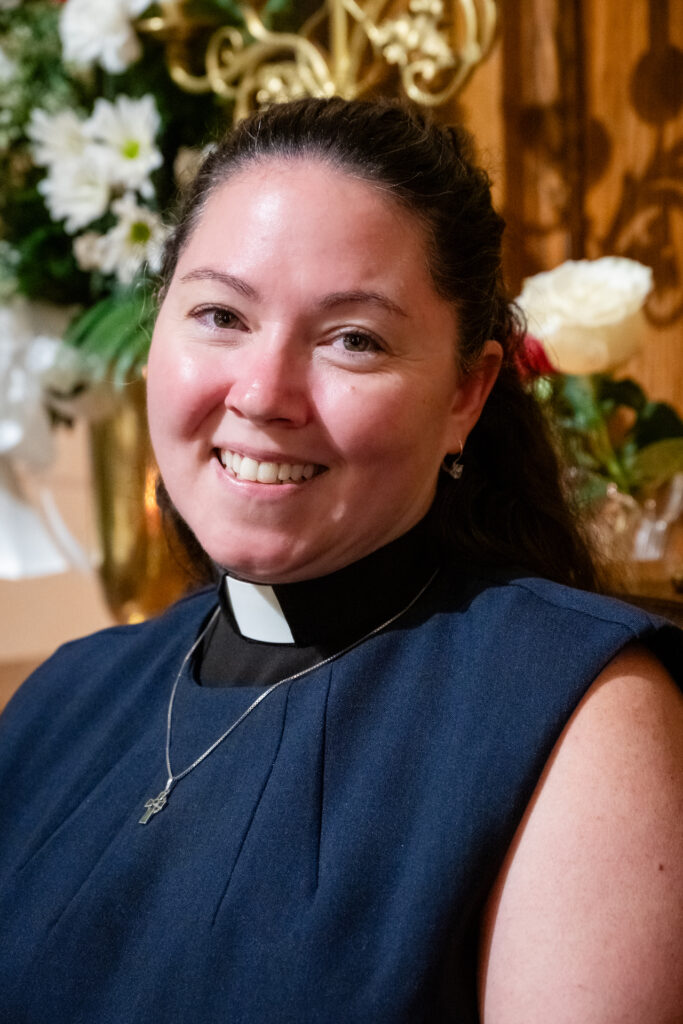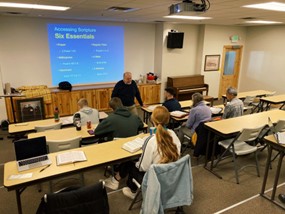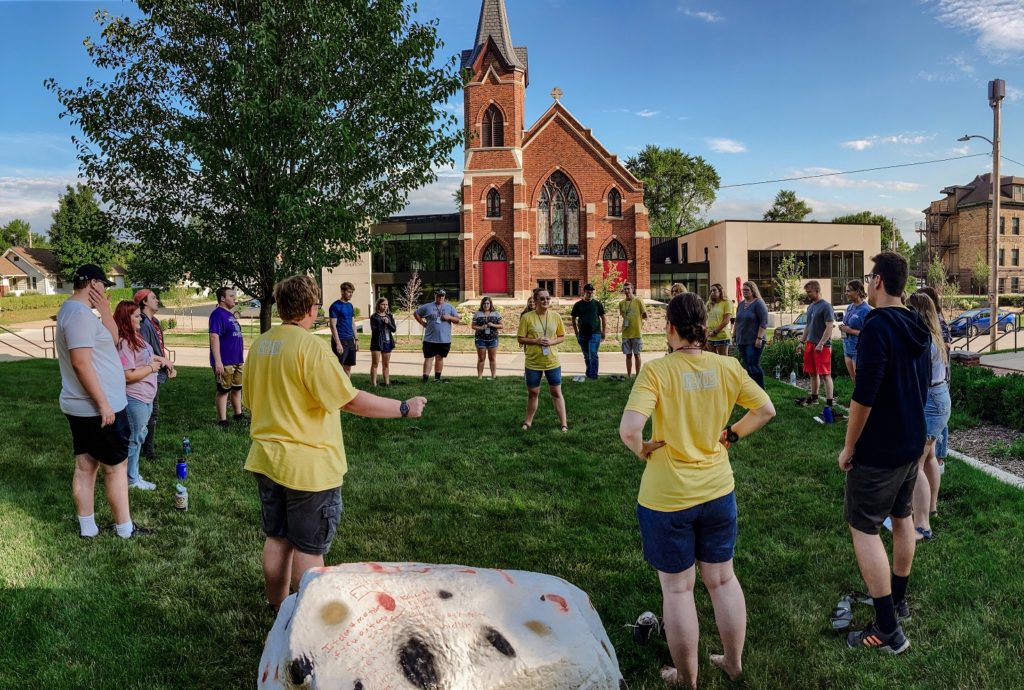With what can we compare the kingdom of God, or what parable will we use for it? –Mark 4:30
For you did not receive a spirit of slavery to fall back into fear, but you have received a spirit of adoption. When we cry, ‘Abba! Father!’ it is that very Spirit bearing witness* with our spirit that we are children of God. –Romans 8:15-16
The first time I read the phrase “kin-dom of God,” I rolled my eyes. It looked to be another attempt to make Christian terminology politically correct—something I have a personal aversion to. So, when I was asked to write a piece on this particular phrase and its usage, particularly amongst progressive Christian circles, I thought I now had an opportunity to academically hammer the phrase.
However, after research, I have become a little more sympathetic to the term. Although, as the title indicates, there is no “kin-dom” of God without the Kingdom of God. Explanation is in order.
The Origins of Kin-dom
Multiple sources trace the origin of “kin-dom” to Georgene Wilson, a Franciscan nun, who spoke it to her friend, mujerista theologian, Ada María Isasi-Díaz.1 Isasi-Díaz then incorporated it into her theological framework and wrote about it in her work “Kin-dom of God: A Mujerista Proposal.”2 Unfortunately, I was unable to find this primary work online, so I am dependent upon a lengthy article by Bridgett Green, Assistant Professor of New Testament at Austin Presbyterian Seminary for insight into Isasi-Díaz’s thoughts.3
For Isasi-Diaz, “kindom” better reflects Jesus’s familial understandings of the community of disciples. Jesus envisioned an extended family with God as father. He announces that all who hear the word of God and do it are his family (Luke 8:21; cf. Mark 3:31-35 and Matthew 12:46-50). Further, Jesus links discipleship to membership in the family of God, saying that any who have left their blood relatives for the sake of the good news will receive back hundredfold in relationships and resources now and in the coming age (Mark 10:29-30, Luke 18:29-30, and Matthew 19:29). Jesus creates and grounds his community of disciples in the principles of kinship—and kinship with God comes not through blood relations but through participation in the duties and responsibilities proclaimed in the Torah and by the Prophets. “Kindom” evokes these values in horizontal relationships among all God’s beloved children, calling disciple communities to live into familial ideals of inclusion, mutual support, and sharing of resources.4
Professor Bridgett Green
I am quite sympathetic to this understanding of how disciples of Jesus interact with each other. St. Paul is emphatic that when we trust in Christ, we are adopted sons and daughters of God. Paul incorporates familial language throughout his letters, in the same vein Isasi-Díaz highlights. If highlighting this aspect of Christian thought was all that was going on, I don’t think there would be much of an issue with using the terminology of “kin-dom” as it would simply be an emphasis of the language of family used throughout the New Testament. However, there are proponents of this terminology who want to get rid of kingdom language totally and replace it with kin-dom. I find this problematic.
Why Erase Kingdom?
According to proponents of “kin-dom,” the language of kingdom presents multiple problems. It has been used by the church to make itself an earthly kingdom with earthly power and might.5 It tends towards exclusivity and can foster competition between kingdoms sometimes leading to violence.6 It is patriarchal in nature.7 And it “includes the specter of humiliation, subordination, punishment, exile, colonialization, sickness, poverty, as well as social, political, economic, and spiritual death.”8
In their view, “kin-dom” represents a much better understanding of what Jesus taught about God’s overall rule and what Jesus’ parables lead us toward.
Let’s work through a few of these things and offer some critique. First, I think we must separate the intent of Jesus’ teachings on God’s Kingdom (and the vision of how it works when God rules) from how sinful human beings have appropriated it. Many of the critiques of kingdom language resonate with the experience of human history, and one needs only pick up a history book to see the truth of what is being said. However, does human failing nullify biblical intent and understanding? Hardly.
Several years ago, I attended a mandatory boundary training in my synod. We were cautioned and steered away from using familial language to describe the church. The reason? Because families are places where abuse takes place; where neglect happens; where harm and pain are caused. It was not until a day or two afterwards that it hit me: not a single good thing was shared about what happens in families. No one spoke about parents who lovingly raise and sacrifice for their kids. No one said a word about how spouses care for each other and build one another up. No one spoke about the emotional support and foundations that are laid to help us cope with things that happen in life. No one said a thing about how the vast majority of parents feed, clothe, shelter, and spend hours upon hours of time with their children raising them to be productive citizens of society. All of the focus was on the bad, and not a single thing was said about the good. Do we abandon the metaphor because there are times of failure? Absolutely not!! Especially when the biblical witness emphasizes the metaphor so much.
I believe the same application is warranted here. Yes, there are, but the vision set forth in the Gospels, epistles, the book of Revelation, and even in the Old Testament lead us to use kingdom language. Why? To emphasize the goodness of God’s rule, and to show that there is a future hope which is a corrective to the failings of humankind.
Second, the kingdom of God is indeed exclusive, and I do not think this is something we as Christians should feel shame about. Paul is explicit in his writings that a person is either “in Christ” or “in Adam.” There is a strong line of demarcation, and the only way to go from one side to the other is through the cross. Essentially, a person either trusts in Christ’s work for salvation (in Christ), or they trust in themselves (in Adam). Either one trusts in grace for one’s righteousness, or one trusts in one’s works. There is no middle ground.
When you trust in Christ and His works, you shift your allegiance. No longer do you live for self: for self-indulgence; for self-affirmation; for self-preservation. Instead, you live for Christ. You live for God. No longer do you lay claim to the throne, but the rightful, righteous ruler is now seated upon the throne of your heart. You now serve a new master. (Romans 6) This is at the heart of the Christian creed, “Jesus is Lord.” You are announcing that Jesus is King of kings and Lord of lords. You no longer rule over your life. Jesus does. And when He is king of your life, you enter into the Kingdom of God.
If you do not trust in Christ’s work, then you are not in the Kingdom of God. You are consumed by other hungers. You are on the outside looking in. In this fashion, the Kingdom of God is indeed exclusive, but, this does not lead to violence and conflict. It is self-righteousness which leads to such things, and a person who knows God’s grace is not self-righteous. They know they have no righteousness of their own. They know their sin. They know their dependence upon God and Christ’s grace. They also know they are commissioned to make disciples of all nations. They know the great command to love their neighbors as themselves. They do not seek to impose the faith or the Kingdom by imposition, but rather by invitation. The doorway to the Kingdom of God is always open, and the desire is to welcome all. Even though it is exclusive, it seeks the inclusion of all. This is not something to be ashamed of in the least.
A final word about patriarchy. Please know that I am using the following definition of patriarchy: a system of society or government in which the father or eldest male is head of the family and descent is traced through the male line. The Kingdom of God is a patriarchy since God is our Father. As such, this is a rather neutral understanding.
However, there is another definition of patriarchy which oftentimes gets applied. “A system of society or government in which men hold the power and women are largely excluded from it.” The Kingdom of God was never meant to be such a thing. One would garner that self-evidently from Jesus’ own teachings on the Kingdom as well as St. Paul’s baptismal theology. However, living this ideal out on earth has proven to be quite difficult, and the Church has fallen very short of the ideal.
But again, the question must be asked: do we abandon the language because the ideal has not been met? No. There is no justification for that. You cannot change reality just by changing language.
Embracing Kingdom
And the reality of the Christian faith is this: you cannot have the “kin-dom” of God without the Kingdom of God.
As I hinted at previously, our Christian faith begins with God’s great grace poured out through the life, death, and resurrection of Jesus Christ. This grace captures and changes our hearts so that our allegiance shifts from ourselves and the desires of the flesh to allegiance to God and the desires of the Spirit. This is a vertical relationship, and it is primary. It must take place first. For through it, we actually fulfill the first and greatest commandment: Love the Lord your God with all your heart, soul, mind, and strength. Everything starts with this vertical relationship.
Then, it moves to the horizontal. Then, it moves into our relationship with our brothers and sisters in Christ. Then, it moves to the second great command to love our neighbors as ourselves. This is where “kin-dom” language can come into play, but again, we must be careful.
Our neighbors may not share the same allegiance that we do. Our neighbors may not have Jesus as their King. They may still be “in Adam.” They still may belong to the kingdom of the world.
I was struck by a paragraph in Professor Green’s article:
This is the expansive sense of family to which Bishop Oscar Romero appealed when he exhorted the soldiers in El Salvador in 1980 before his assassination. He reminded them of Jesus’s vision of kinship, reminded them that we are all children of God, that we are connected through an honor code that values all, that provides security and a foundation for each person to be able to extend themselves into the community without losing their identity and sense of self.9
Bishop Romero appealed to the idea of “kin-dom” with the soldiers of El Salvador, but they still assassinated him. Why? Because they were serving a different master. They were serving a different king. They were not serving the King of kings and Lord of lords. Their hearts had not experienced the grace of God which would lead them away from committing such a heinous crime. The vertical relationship must always come first, and the Church’s primary job in the world is the proclamation of the Gospel which makes disciples of all nations–which calls our neighbors to have the same allegiance as we do.
To erase kingdom and replace with “kin-dom” means to place the second commandment above the first. It seeks to establish the kingdom without the King. That is not an option within the Christian faith, and it ultimately leads to failure. You simply cannot have the “kin-dom” without the Kingdom.
1. Florer-Bixler, Melissa. “The Kin-dom of Christ.” Sojourners. Nov. 20, 2018. https://sojo.net/articles/kin-dom-christ,
Green, Bridget. “On Kingdom and Kindom: The Promise and the Peril.” Issuu. Fall 2021. https://issuu.com/austinseminary/docs/insights_fall_2021_i/s/13746319
Butler Bass, Diana. “The Kin-dom of God.” Red Letter Christians. Dec.15, 2021 https://www.redletterchristians.org/the-kin-dom-of-god/
2.Green. https://issuu.com/austinseminary/docs/insights_fall_2021_i/s/13746319
3.Ibid.
4.Ibid.
5.Butler Bass. https://www.redletterchristians.org/the-kin-dom-of-god/
6.PCUSA. “Bible study at GA223 will Explore ‘kin-dom’ versus ‘kingdom.’” Feb.12, 2018
https://www.pcusa.org/news/2018/2/12/bible-study-ga223-will-explore-kin-dom-versus-king/?fbclid=IwAR2fVkwtu41Zps66Wvxa_QdQfqVUiMrPeb96vhyHxKSNYAwPCFDQLv4dJuc
7.Montgomery, Herb. “A Kingless Kingdom.” Renewed Heart Ministries: eSights and Articles. May 31, 2019. https://renewedheartministries.com/Esights/05-31-2019/
8.Green. https://issuu.com/austinseminary/docs/insights_fall_2021_i/s/13746319
9.Ibid.




















